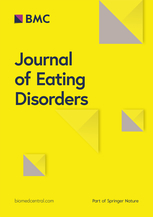Stein Frostad, Yngvild S. Danielsen, Guro Å. Rekkedal, Charlotte Jevne, Riccardo Dalle Grave, Øyvind Rø and Ute Kessler
 Journal of Eating Disorders 2018 6:12 Open Access
Journal of Eating Disorders 2018 6:12 Open Accesshttps://doi.org/10.1186/s40337-018-0198-y
Abstract
Background
Anorexia nervosa (AN) in adults is difficult to treat, and no current treatment is supported by robust evidence. A few studies, most of which were performed by highly specialized research units, have indicated that enhanced cognitive behaviour therapy (CBT-E) for eating disorders can be effective. However, the dropout rate is high and the evidence from non-research clinical units is sparse.
Methods
This quality assessment project implemented CBT-E in an outpatient setting at a public hospital. Forty-four patients with AN started therapy. Each patient received at least 40 sessions of CBT-E over a 12-month period. Their body mass index (BMI) was recorded at baseline and after 3, 6 and 12 months. Reasons for not starting therapy or for leaving therapy prematurely were recorded.
Results
Half (n = 22) of the 44 patients who started outpatient CBT-E did not complete the treatment. In the remaining sample there was a large (and statistically significant) weight gain after 12 months. The percentage of patients achieving the target BMI of > 18.5 kg/m2 was 36.4, 50.0 and 77.3% after 3, 6 and 12 months, respectively.
Conclusions
This quality assessment project shows that it is possible to establish effective CBT-E in an outpatient eating-disorder unit at a public hospital. Although half of the patients did not complete CBT-E, the remaining patients achieved a significant increase in BMI at 1 year after the start of therapy.
Keywords





